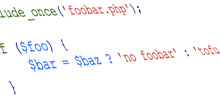Being in any industry brings its own set of jargon – most of it is uninteresting and only understandable to those in who’ve been around a while, but every once and a while, some of the jargon can be funny, geeky, or whimsical.
What follows is a list of some of the best jargon and lingo of the Internet development industry. Some you may have heard before, but some you probably haven’t.
Coding
Yoda Conditions
While most programmers think to write their conditions like this:
if (variable == "literal") {
// code
}A Yoda Condition reverses this conditional statement:
if ("literal" == variable) {
// code
}While compilers should be updated to not allow variable assignment within an if statement, many still allow it (JavaScript for example). If you use a Yoda Condition within your if statements, you will get an error if you try to assign the variable to a literal (by accidentally using ‘=’ instead of ‘==’ which you may not catch).
Jackers / Tracker Jackers
Someone who calls themselves a ‘hacker’ by doing something that doesn’t involve a technological security breach.
For example, Bob says, “I just hacked John’s PC. He walked away from his computer without locking it so I got on his email and sent a nasty note to the CEO”. Bob is not a hacker, he’s a Jacker. A Tracker Jacker differs from a regular Jacker in that the Tracker Jacker follows someone and waits for them to slip up.
Stringly Typed
A riff on strongly-typed. Used to describe an implementation that needlessly relies on strings.
Ninja Comments
Stealth comments. Invisible comments. Also known as… no comments at all
Rubber Ducking
When you can’t figure out something in your code without talking it out with someone. Developers have been known to keep a rubber duck by their desk in case there is no one around to talk out a problem.
Kevin Spacey
Used as a verb or noun. A take on two different people. Kevin Spacey and Kevin from Home Alone. Just like how Kevin is always forgotten, when someone forgets the spacing method of their company’s standards and mix tabs/spaces.
Workaroundability
This is the feeling when an already hacked approach still can or can’t be hacked further.
DOCTYPE Decoration
When a developer specifically specifies a DOCTYPE but doesn’t abide by the DOCTYPE rules, thus making it simply nothing more than a decoration.
Hot Pocket / Hot Pockets
HTTP and HTTPS. Also known as Hot Potato / Hot Potatoes
Dumbledore Class
When a class name gets so large the name is laughably long, like Dumbledore’s full name: Albus Percival Wulfric Brian Dumbledore.
class AlbuPercivalWulfricBrainDumbledore {
// There's gotta be a smaller class name we can use
}Bugs
Heisenbug
Term for a software bug that seems to disappear or alter its behavior when one attempts to study it. The term is a pun on the name of Werner Heisenberg, the physicist who first asserted the observer effect of quantum mechanics, which states that the act of observing a system inevitably alters its state.
Hydra Code
Code that cannot be fixed. Like the Hydra of legend, every new fix introduces two new bugs. It should be rewritten.
Bugfoot
A bug which some claim to have seen, but most have not, and doubt it’s existence.
Shrug Report
A bug report with no error message or repro steps and only a vague description of the problem. Usually contains the phrase “doesn’t work.”
Hindenbug
A play on the word Hindenburg, a bug with catastropic behavior. Example: Accidentally running a SQL query with a DELETE and no WHERE clause.
Grass is Greener Code
Bug that exists in code that only runs in production. An example might be:
if (environment == 'dev') {
// Code runs in dev environment
} else if (environment == 'prod') {
// You'll never see this code execute except in production.
// Hope it doesn't reveal you liked Twilight or Bieber or something
}Mad Girlfriend Bug:
When you see that something is clearly wrong, but the software is telling you everything is fine.
Horcrux Bug
When a seemingly small bug turns out to span multiple systems and you must traverse the entire app or multiple applications to fix many, smaller bugs in order to fix a single reported bug.
General Industry Jargon
Intersoftwarian
A software developer specializing in internet applications.
GUrui
Play on Guru and GUI. Someone who thinks they are the authority on how everyone understands GUI without any usability background or training.
20 Cent Shift
When you can’t take the buzz word “paradigm” shift anymore. A pair of dimes = 20 cents.
Duck
Some people like to feel important, and won’t stop looking or stop being picky until they find something to remove. A “Duck” is a feature added for no other reason than to draw management attention and a directive that it be removed, thus avoiding unnecessary changes in other aspects of the product. Example, “I really like the professional banners, logo, and content that really represents our company as a legitimate Hedge Fund Investment corporation… but lose the giant photo of the duck”.
Unicorny
An adjective to describe a feature that’s so early in the planning stages that it might as well be imaginary.
Common Law Feature
A bug in the application that has existed so long that it is now part of the expected functionality, and user support is required to actually fix it.
Code Slush
Where a Code Freeze stands for the date after which no changes will be accepted, a Code Slush is when you attempt a Code Freeze except all the changes that management will ask for at the last minute.
Xanatos App / Xanatos Gambit
A play on the Xanatos Gambit, when an app is so inherently flawed that any bug fix creates a new bug. Similar to Hydra Code, but where even rewriting the application is not an option.

